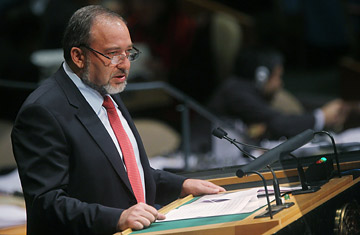
sraeli Minister for Foreign Affairs Avigdor Lieberman speaks at the 65th session of the United Nations General Assembly.
On Tuesday, the foreign minister of Israel said what he's been saying for years. Avigdor Lieberman declared that the boundaries of a new Palestinian state should not be drawn based on a map from 1967, which was the last year an Arab state existed to the immediate east of Israel. Lieberman said the borders should, rather, be sliced into predominantly Arab sections of Israel, taking into the new state as many Arabs as possible and leaving the Jewish state, in a perfect world, just to the Jews.
"We are not talking about population transfer," Israel's top diplomat averred, beating back any suggestion of uprooting people, which is also known as ethnic cleansing. "But about defining borders so as best to reflect the demographic reality."
Unfortunately it was another reality that governed on Tuesday. Lieberman was speaking not in Israel, where his views are known as distinctly his own, as is the party he heads. The audience at hand was the United Nations, where in the absence of Prime Minister Benjamin Netanyahu, the foreign minister of Israel was presumed to be speaking for his country at a moment of exquisite sensitivity.
The Palestinian delegate got up and walked out.
"This man is completely detached from political reality," Riyad Mansour, the permanent observer for Palestine, told reporters afterward.
What effect, if any, Lieberman will actually have on the already tenuous peace talks between Israel and the Palestinian Authority (PA) remains to be seen. Even before the Soviet emigre took the lectern, the talks were in jeopardy owing to Israel's decision to end on schedule two days earlier a 10-month moratorium on the construction of settlements on occupied Palestinian territory. PA president Mahmoud Abbas had repeatedly threatened to end the talks if building resumed. But the Jewish holidays have kept any noticeable construction from actually going forward, and Abbas now says he will seek guidance from the Arab League when it meets next week in Cairo.
Netanyahu's office released a statement saying Lieberman was speaking only for himself, and that the prime minister remains in charge of negotiations. This was, on one level, an entirely credible point: In Israel's parliamentary system, the foreign ministry was simply Lieberman's reward for throwing his party's seats into a coalition government led by Netanyahu's Likud party. Lieberman tends to do what he wants with the ministry.
But Netanyahu certainly could have stopped him from going to New York, not least by going himself. A spokesman said Bibi chose to observe the Jewish holiday of Sukkoth at home. "The Prime Minister needs to decide if he is running a country or conducting a choir," said Naham Shai, a member of the Knesset from the centrist Kadima party. "The foreign minister's statements are in complete opposition to the declared policies of the government..." Another parliamentarian described Netanyahu's response as "flaccid." The whole episode refreshed speculation about whether Netanyahu is sincere in entering negotiations to end the conflict with the Palestinians once and for all, or, as Lieberman suggested, merely going through the motions in order to rehabilitate Israel's international reputation.
What's not in question, at least inside Israel, is that Lieberman speaks for a great section of the Jewish public on the matter of keeping a distance from Arabs. Outsiders forget that one in five Israeli citizens is in fact Palestinian, or Arab-Israeli, descended from residents who simply did not leave their homes when Jewish armies won the battle for what they called their own rightful homeland.
Citizens in name and form — Israel's street signs are written both in Hebrew and Arabic — they live separate lives, in enclaves characterized chiefly by poverty and mutual mistrust. That mistrust is due partly to fears of terror; though the threat comes largely from Palestinians who venture into Israel from occupied territories, the effect is to make any Arab an object of suspicion. In a city where buses once exploded all too often, the new light rail system about to open in Jerusalem recently surveyed potential passengers. One question: "All passengers, Jewish and Arab, enter the train feely and without the driver's inspection. Is that a problem for you?"
But the alienation is mutual and goes beyond security. Only one in 10 Israeli Jews told political scientists at Tel Aviv University last month that Arab-Israelis have a feeling of commitment to the state. Half of the Arab-Israelis, meanwhile, described their own feeling as "neutral." "How can I feel at ease?" says Hanin Zoabi, an Israeli legislator who is also a Palestinian, elected from Nazareth (and notorious to Jewish Israelis as a passenger on the Turkish relief vessel headed for Gaza that was stormed by their country's commandos in the flotilla fiasco at the end of May). "Lieberman may represent most of them. I know he doesn't represent the margins of society. I know my citizenship in Israel is not full citizenship. I know in Israel they think they do me a favor by giving me citizenship at all."
Lieberman's Yisrael Beiteinu party ("Israel is Our Home") finished third in the 2009 election, just ahead of Labor, the party that dominated Israel at its founding, and defined a liberal national ethos that placed high value on inclusion. The new party does particularly well among Soviet émigré strongholds such as Ashdod, a port city where in June the deputy mayor, Boris Giterman, made news for disparaging Arabs in coarse language to a leftist visitor.
Giterman later denied using vulgarity, but claimed that in 36 years in Israel he had yet to see any difference between Palestinians on one side of the 1967 Green Line and the other. Zoabi, he said, "is brazen and she should be thrown down the stairs. I don't like them, and don't really see any difference."
